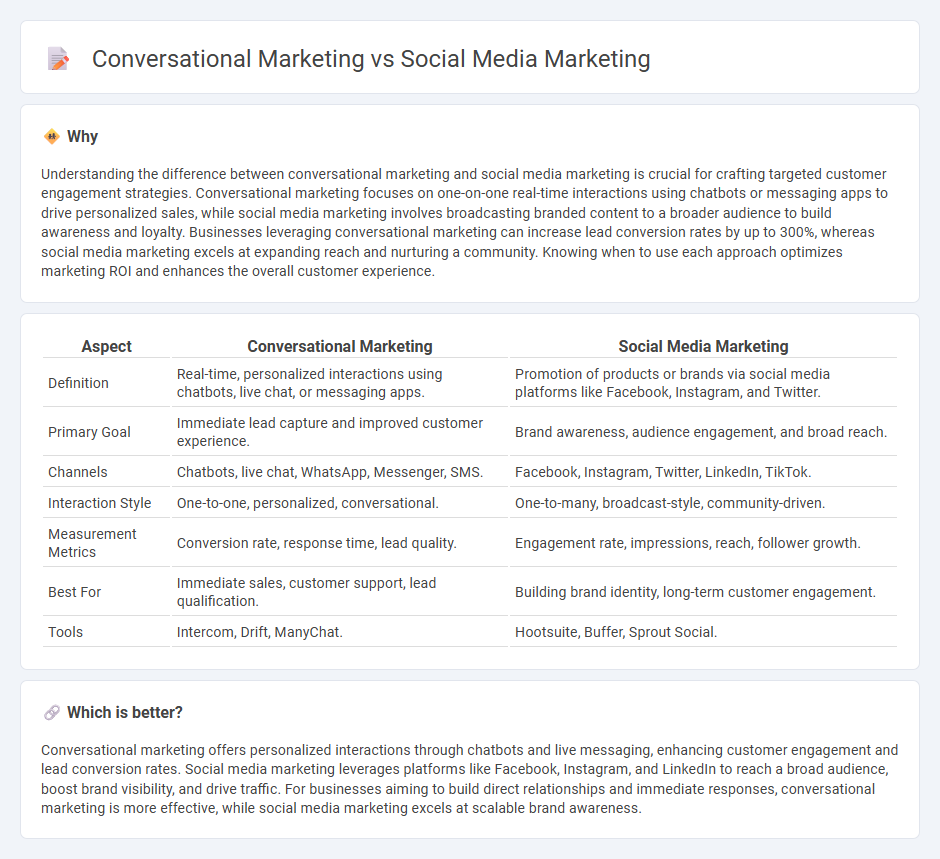
Conversational marketing focuses on one-to-one interactions using chatbots, live chat, and messaging apps to create personalized customer experiences and increase engagement. Social media marketing leverages platforms like Facebook, Instagram, and Twitter to build brand awareness, share content, and reach broad audiences through targeted advertising. Explore the unique advantages and strategies of conversational marketing versus social media marketing to enhance your marketing efforts.
Why it is important
Understanding the difference between conversational marketing and social media marketing is crucial for crafting targeted customer engagement strategies. Conversational marketing focuses on one-on-one real-time interactions using chatbots or messaging apps to drive personalized sales, while social media marketing involves broadcasting branded content to a broader audience to build awareness and loyalty. Businesses leveraging conversational marketing can increase lead conversion rates by up to 300%, whereas social media marketing excels at expanding reach and nurturing a community. Knowing when to use each approach optimizes marketing ROI and enhances the overall customer experience.
Comparison Table
| Aspect | Conversational Marketing | Social Media Marketing |
|---|---|---|
| Definition | Real-time, personalized interactions using chatbots, live chat, or messaging apps. | Promotion of products or brands via social media platforms like Facebook, Instagram, and Twitter. |
| Primary Goal | Immediate lead capture and improved customer experience. | Brand awareness, audience engagement, and broad reach. |
| Channels | Chatbots, live chat, WhatsApp, Messenger, SMS. | Facebook, Instagram, Twitter, LinkedIn, TikTok. |
| Interaction Style | One-to-one, personalized, conversational. | One-to-many, broadcast-style, community-driven. |
| Measurement Metrics | Conversion rate, response time, lead quality. | Engagement rate, impressions, reach, follower growth. |
| Best For | Immediate sales, customer support, lead qualification. | Building brand identity, long-term customer engagement. |
| Tools | Intercom, Drift, ManyChat. | Hootsuite, Buffer, Sprout Social. |
Which is better?
Conversational marketing offers personalized interactions through chatbots and live messaging, enhancing customer engagement and lead conversion rates. Social media marketing leverages platforms like Facebook, Instagram, and LinkedIn to reach a broad audience, boost brand visibility, and drive traffic. For businesses aiming to build direct relationships and immediate responses, conversational marketing is more effective, while social media marketing excels at scalable brand awareness.
Connection
Conversational marketing leverages real-time, personalized interactions between brands and customers, often facilitated through chatbots and messaging apps integrated into social media platforms. Social media marketing amplifies these interactions by providing a broad audience base and tools for targeted engagement, enabling brands to foster deeper relationships and drive conversions. Combining conversational marketing with social media strategies enhances customer experience and accelerates the sales funnel, utilizing data-driven insights from user interactions across channels.
Key Terms
**Social Media Marketing:**
Social media marketing leverages platforms like Facebook, Instagram, and Twitter to build brand awareness, engage target audiences, and drive conversions through tailored content and paid advertising campaigns. It utilizes analytics tools to optimize reach and engagement metrics, ensuring effective targeting based on demographics and user behavior. Explore our comprehensive guide to discover advanced social media strategies and tools for maximizing marketing ROI.
Engagement
Social media marketing leverages platforms like Facebook, Instagram, and Twitter to boost brand visibility through targeted content and paid ads, driving broad audience engagement. Conversational marketing uses real-time, personalized interactions via chatbots, live chat, and messaging apps to foster deeper connections and immediate customer responses. Explore detailed strategies to enhance engagement in both marketing approaches.
Content Creation
Social media marketing leverages targeted content creation to engage broad audiences on platforms like Instagram, Facebook, and Twitter, using posts, videos, and stories optimized for brand awareness and audience reach. Conversational marketing centers on personalized, real-time content through chatbots and messaging apps, enhancing customer interaction and driving conversions by addressing individual needs. Explore how integrating these strategies can maximize your content creation impact and business growth.
Source and External Links
What is social media marketing (SMM)? - Social media marketing is the use of social media platforms to connect with an audience, build brand awareness, increase sales, and drive website traffic by posting engaging content and fostering online community.
How to Build Your Social Media Marketing Strategy - Social media marketing involves promoting products or services on platforms like Instagram, Facebook, and X by creating engaging content, interacting with customers, and utilizing social media management tools with a focus on dynamic content and influencer marketing in 2025.
Social Media Marketing for Businesses - Social media marketing leverages popular networks through both organic content and paid advertising to reach prospects, build brand loyalty, and drive sales with strategies that include measurable goals and ongoing audience engagement.
 dowidth.com
dowidth.com